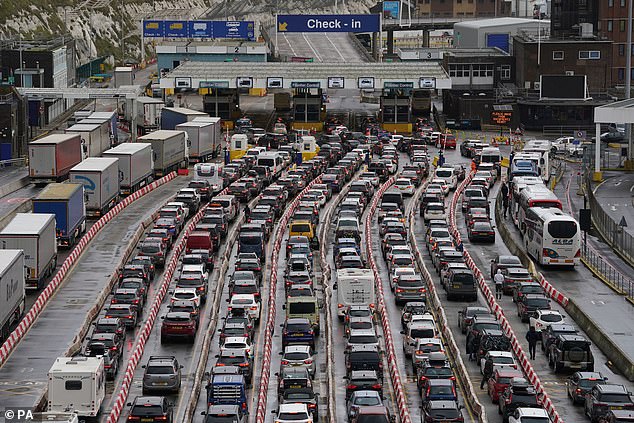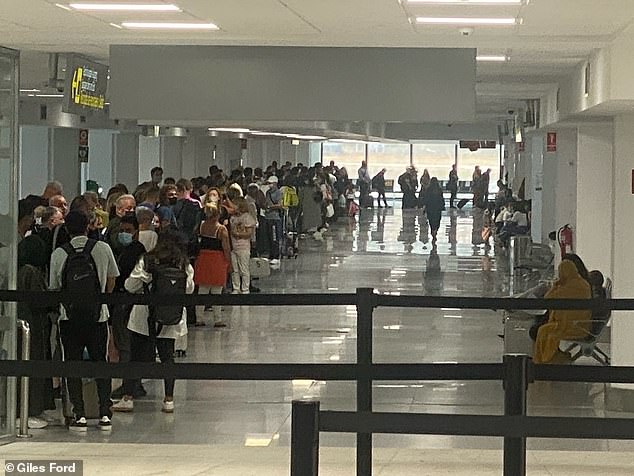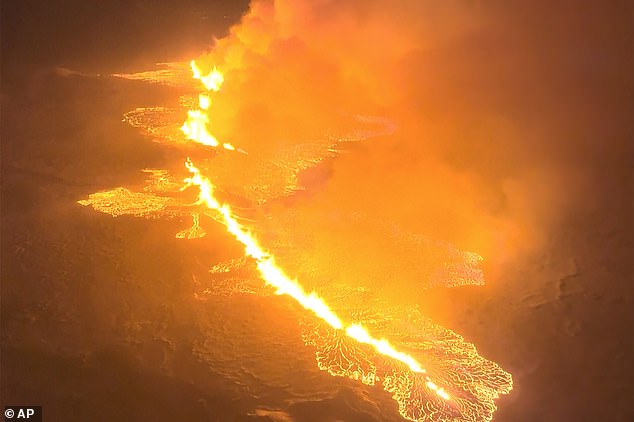Brits will have to give fingerprints to holiday in Europe: Holidaymakers face travel chaos next autumn with introduction of post-Brexit checks and facial scans on entry into EU
Visitors to Europe will be confronted with huge queues at the borders from next autumn due to new strict border controls after Brexit.
British and non-EU passport holders will have to undergo fingerprint checks and facial scans under the new EU Entry/Exit System (EES).
It will replace the stamping of passports that started after Brexit, when Britain became a 'third country' for the bloc – meaning it is not a member state and has no right to free movement within the EU.
The system checks the name and biometric data of each passenger when they enter an EU country.
It was supposed to be rolled out earlier this year but has been postponed several times.

Queues at the Port of Dover, one of the locations where the new border controls will take place
Some countries have expressed concerns about the amount of time the process will add to queues at EU borders, with the Slovenian government saying it will take 'up to four times longer'.
Despite concerns, EES will be introduced on October 6, according to the Independent.
Every time visitors try to enter the continent, they must show a facial image and leave four fingerprints.
Personal details including first name, last name, date of birth, nationality, gender, travel document and three-letter country code are all required – except for children under 12 years of age.
Austria claims processing time would be 'double compared to the current situation', while Croatia warned that checks would 'certainly take significantly longer'.
French officials will carry out EES border checks at the port of Dover, Folkestone for the Eurotunnel and at St Pancras International for the Eurostar.
In a report released earlier this year, France's public finance watchdog Cour des Comptes predicted that queues at the border between Britain and France will at least double when the EES is launched in 2024.
The Port of Dover, which regularly experiences long delays due to post-Brexit checks, said the new system could extend car inspections from 45 seconds to as long as ten minutes.

British travelers queue for hours at passport control at a Spanish airport
Port chief Doug Bannister said: 'Even at the busiest times right now, with the new post-Brexit rules, passport checks take 45 to 90 seconds per car.
'With pre-registration, a car with a family of four or five people can take ten minutes.
“The government should urgently discuss with its French and EU colleagues how this will work.”
Eurotunnel warned it could take up to six minutes longer to process each car boarding the train.
EES covers arrivals in all EU countries except Cyprus and Ireland. It is also adopted by Iceland, Norway, Switzerland and Liechtenstein.
One of the reasons for delaying its introduction was next year's Olympic Games in Paris, with chiefs warning it could cause chaos for millions of passengers traveling to France.
About six months after EES is introduced, the EU will introduce ETIAS – a visa waiver system similar to the US Esta.
This costs €7 (£6) per person and is required for people entering the Schengen area.
The EU has dismissed concerns that ESS will cause chaos at borders, claiming it will actually save time.
A spokesperson said: 'The main benefit of the EES is time saving.
'The EES replaces stamping in passports and automates border control procedures, making travel to European countries using the EES more efficient for the traveler.'

Holidaymakers must wait anxiously to see whether the eruption of a volcano in Iceland will interrupt their flights to the country
It comes as holidaymakers eagerly wait to see if the eruption of a volcano in Iceland will interrupt their flights to the country.
The eruption on the Reykjanes Peninsula, just north of the evacuated town of Grindavik, started around 10:17 pm last night after an earthquake swarm, the Icelandic Meteorological Office said, referring to a series of small tremors.
There are fears the eruption, which sees 200 cubic meters of lava spewing from the fissures every second, could cause major damage to air traffic after the 2010 Icelandic eruption grounded thousands of flights in Europe and North America and affected holidaymakers beaches.
Flights from Keflavik International Airport in Reykjavik were delayed last night, with an EasyJet flight to Manchester left on the tarmac for five hours before departing at 1.35am due to the volcanic activity.
Passengers were told by easyJet: 'We're sorry your flight has been delayed. This is because the volcanic activity in Keflavik (KEF) is causing restrictions in the areas where aircraft are allowed to fly.”
British holidaymakers are anxiously awaiting whether their flights will be canceled today – but the Icelandic government and airlines including EasyJet have said Iceland's airports are 'not affected' and flights should operate 'as planned'.
Hallgrímur Indriðason, a journalist for Icelandic state broadcaster RUV, said there was “no threat to air traffic – at least not for the time being” as Reykjavik's Keflavik International Airport remains open today.
Previous eruptions near the Fagradalsfjall volcano on the Reykjanes Peninsula occurred in 2021, 2022 and earlier this year.
In 2010, the eruption of Iceland's long-dormant volcano Eyjafjallajokull – an ice-covered volcano more than 1,660 meters high – shot enormous amounts of ash into the atmosphere. That massive, explosive eruption was not fatal, but it canceled about 100,000 flights and left more than 10 million travelers stranded.
